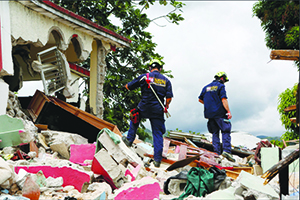By LISA EISENHAUER
Several Catholic agencies already working in Haiti rushed medical and humanitarian support to victims of the earthquake that struck a southwestern region of the country on Aug. 14.

First responders with the Fairfax County, Virginia, Fire and Rescue Department search through rubble left by the earthquake that rocked southwestern Haiti on Aug. 14. The men were part of a disaster response team sent by the U.S. Agency for International Development.
U.S. Agency for International Development
The U.S. Agency for International Development reported five days after the 7.2-magnitude quake that almost 2,200 people were known to be dead and more than 12,000 injured. The agency said about 130,000 homes were damaged or destroyed and 2.2 million people in the impoverished Caribbean nation of 11.3 million were somehow impacted by the disaster.
Kevin Kostic, director of donor relations for Catholic Relief Services, said his organization had teams in the quake area almost immediately after the temblor to help victims and provide medical supplies, hygiene products and other needed supplies.
"It has been a challenge, frankly, to be able to get out to the various areas," he said.
Kostic was among several representatives of relief and support agencies who discussed how their organizations are responding and how others can help during a group call about the disaster on Aug. 18 arranged by Bruce Compton, CHA's senior director, global health.
By late August, Catholic Relief Services reported that it had expanded its efforts in Haiti and was providing metal roofing sheets and tarps to hundreds of families in the quake zone.
Dianne Jean-FranÇois, country director for Haiti for the Catholic Medical Mission Board, spoke from Haiti during the call. She said her organization responded to the earthquake zone immediately with medical supplies and medical workers to treat the injured and to support local medical facilities.
The earthquake exacerbated the despair in the distressed nation, the relief workers said. In addition to the COVID-19 pandemic, Haiti has been reeling from the political instability created by the assassination on July 7 of its president. A portion of the road to the quake zone from the capital of Port-au-Prince is under gang control.
Rachel Ross, chief development officer of Health Equity International, said her group was caring for quake victims at its St. Boniface Hospital in Fond-des-Blancs, Haiti, which is near the epicenter of the quake. The organization also worked with the Ministry of Health and other partners to expand surgical services elsewhere and to bring in medications and equipment.
Camille Grippon, system director for global ministries at Bon Secours Mercy Health, said her health system teamed up with several partners to get supplies to the quake region. It worked with CHRISTUS Health to get $125,000 worth of IV solutions to the Catholic Medical Mission Board and it teamed with Midwives for Haiti to get tents and supplies and set up temporary operations adjacent to a birth center that was inoperable after the quake.
"The midwives are reporting lots of trauma and secondary morbidities, but they are in good spirits and have delivered many babies," Grippon said about two weeks after the disaster hit.
Several of the agency representatives said that the need for assistance in Haiti is great and support for their efforts is welcome. They urged, however, that donors send only cash or aid that has been specifically requested.
They noted that sending supplies that haven't been requested can clog up the system for distributing needed items and create waste. "Obviously we don't want to do any harm," Grippon noted.
Compton pointed out that the USAID website has a list of organizations that are responding to the Haiti disaster. He also urged potential donors to check out the disaster resources section of CHA's website for advice on how best to assist in global emergencies.